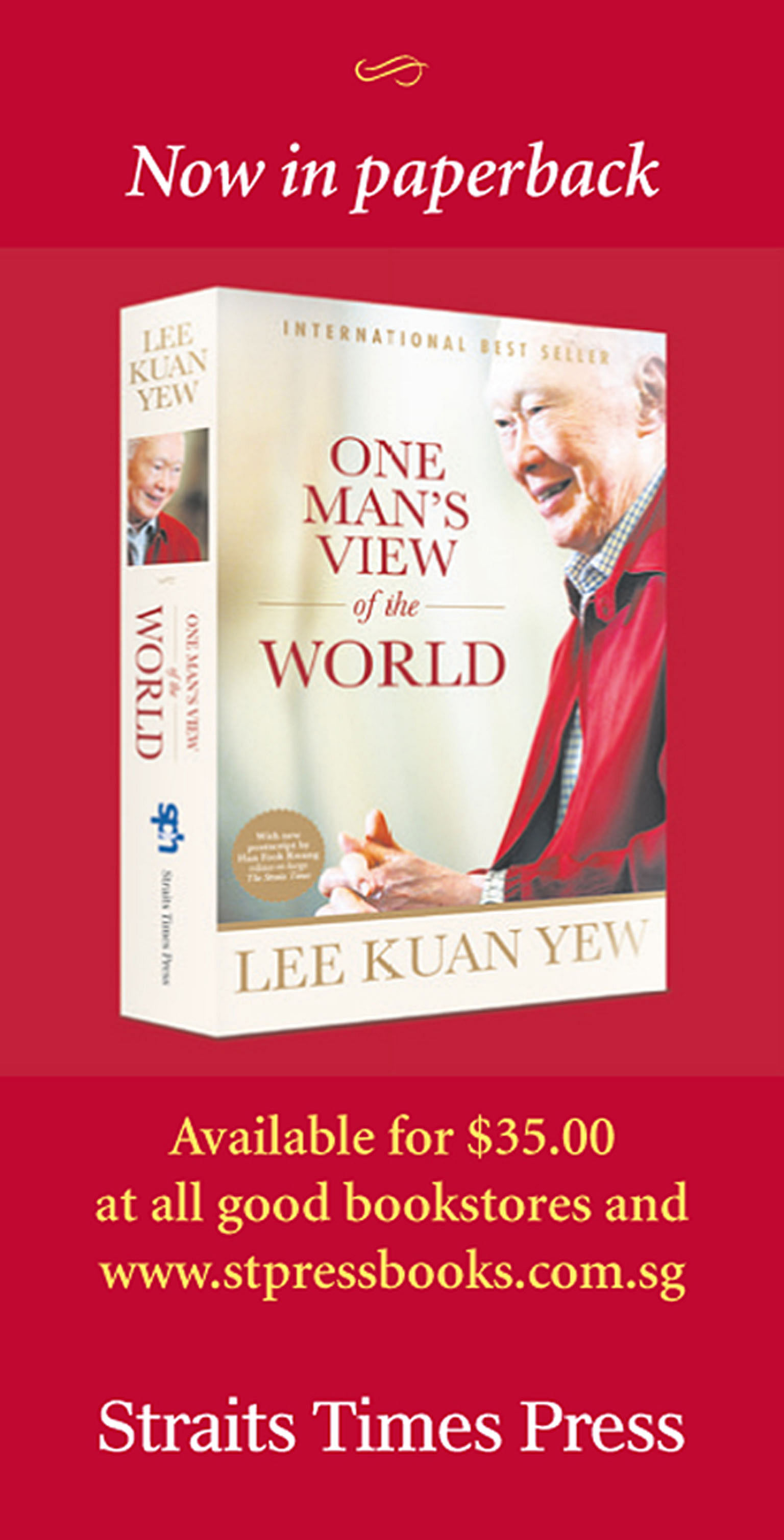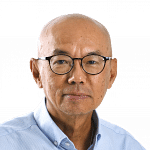Lee Kuan Yew first suggested doing this book five months after he had stepped down from the Singapore Cabinet following the 2011 General Election. He wanted to focus on issues outside Singapore, how he saw world events unfolding in the next 10 years. It would enable him to cast his expansive mind far onto the international horizon and into the future, tapping his experience and insights from his travels and meetings with world leaders.
He asked us to help him do such a book, incorporating the concept in our previous book, Hard Truths To Keep Singapore Going, which was based on extensive interviews with him. I e-mailed him a proposed outline of the book, and he replied within two hours, a little after midnight on Nov 15, 2011: "Good proposals and excellent themes. Gives me scope to sketch my world view of the present, and anticipate the immediate future, five to 10 years. Am willing to start any time."
He was keen to get going. When we took our time to sketch out the book's chapters and prepare the background material, he e-mailed me again: "Is your team ready to start?"
We had our first interview with him on Jan 9, 2012 and the last one in October that year.
What do I remember of these sessions with him now, some five years later? Looking back, it wasn't anything he said in particular - although he said much, enough to fill the pages of this book, and more. What I remember most was his determination to complete the book and to attend every interview scheduled despite his failing health. The deterioration in his physical stamina was quite marked and visible. In that January session, he was alert and in good form, perked perhaps by the anticipation of starting on another book. But his voice had grown weak and would become softer still over the next 10 months of interviews. In Hard Truths, many of the interviews lasted two hours. But this time round we had to wrap it up before the hour was up. Often he would stop to take his medicine. Once he hiccuped throughout the interview. But always he persevered despite the discomfort.
He was still sharp mentally, though, and he took all our questions.
It is possible now to look back at his answers and say where he was right or wrong in his predictions and analyses. But it has to be a tentative assessment. The political landscape can be very fluid and change dramatically in weeks if not days. Indeed, unpredictability is the new norm with one dramatic event after another - Brexit, Donald Trump's election, the impeachment of former South Korean president Park Geun Hye, to name a few in the past year. Imagine how risky it would be, trying to forecast what might happen in the next 10 years. But when you have Lee Kuan Yew in front of you, how to resist picking his brains on what is likely to unfold in China, the United States, Europe, Japan, South-east Asia and, of course, Singapore?

He was right on the unsustainability of the European Union, pre-Brexit, firm in his view it could not remain for long in its present form and predicting a messy break-up.
This was what he said: "I'm not sure it will last 10 years. The only alternative is to make it work by integration. The European Central Bank becomes the Federal Reserve and instead of different finance ministers you have one for Europe and the budgets of all the various countries will be supervised by that one finance minister, then it'll be like the United States. I don't see that happening. So the break-up (will be) messy and they will try and postpone it. For how long? Ten years? I doubt it. Can they save it by having a core Europe? Doubtful but even if it does, the euro has failed."
Could he have predicted Britain leaving? Alas, we did not ask. It seemed so improbable then.
He did not, of, course, foresee someone like Donald Trump becoming president but he was right in believing in the dynamism of the American system, especially on the economic front. The interviews were done in 2011 when US economic growth was only 1.6 per cent and still struggling to recover from the recession in 2009 following the financial crisis. But he was confident that growth would return. The US is now one of the best-performing economies in the developed world.
Mr Lee put it this way:
"Relative to China, they will be less powerful but they are not on the decline. They are a more creative society. Look, even today, iPhones, iPads, all the Apple products, Microsoft, the Internet, who comes up with it? It's a more creative society. The Chinese civilisation, when the centre is strong, the country prospers. And the country prospers because the centre makes sure that everybody obeys the centre. In America it's different. Nobody obeys Washington or New York. Anybody can start another centre if you've got money."
On China, which we spent the most time on, he was confident the centre would hold. The Communist Party had a strong grip on power, now equipped with "helicopters, the Internet, cellphones and rapid deployment of security forces" and would move only gradually on loosening the political system.
What about democracy and a one-man-one-vote system, which some foreign observers thought could come to China?
"When I read that, I said: 'These people know nothing about China.'"
When we quizzed him on the shifting balance of power between China and America, his eyes would narrow, his gaze fixed on some point unbeknown to us as he scanned the realm of possibilities.
It was the sort of question this book was meant to ask, probing his long-range thinking.
"In time I see the Chinese striving to keep their eastern seaboard free from American spying... But to be able to push the Americans further from their coast, they need to improve the technology behind their long-range missiles... So eventually, there will be a balance... in 20 or 30 years.
"The first balance will be pushing the Americans out of the 12-mile limit. The second balance will be pushing them out of their 200-mile exclusive economic zone. And once they can do that, they become the most influential power in the region."
He was always the hard-headed realist.
We spent as much time on Singapore, his lifetime project, but now facing new challenges with a new generation that had just voted the People's Action Party out of a group representation constituency (GRC) in Aljunied, in the 2011 General Election.
How did he see the political winds shifting? Would it result in further changes down the road, perhaps even lead to a two-party system?
He refused to see it in those terms, downplaying the significance of the Workers' Party's (WP) victory and rejecting the idea that it signalled a new era for politics here.
That GRC result, he pointed out, was because WP leader Low Thia Khiang left his Hougang ward to lead the fight in Aljunied and introduced a new candidate, Chen Show Mao.
He was telling us, don't read too much into it.
Mr Lee passed away on March 23, 2015, six months before the General Election in which the PAP recovered much of the ground it had lost in 2011 and almost recaptured Aljunied GRC.
Many attributed its better- than-expected showing to the "LKY" effect.
In death, as in life, Singapore had felt his overpowering presence.
- The writer is Editor-at-Large and former editor of The Straits Times. He led the editorial team behind One Man's View Of The World.


